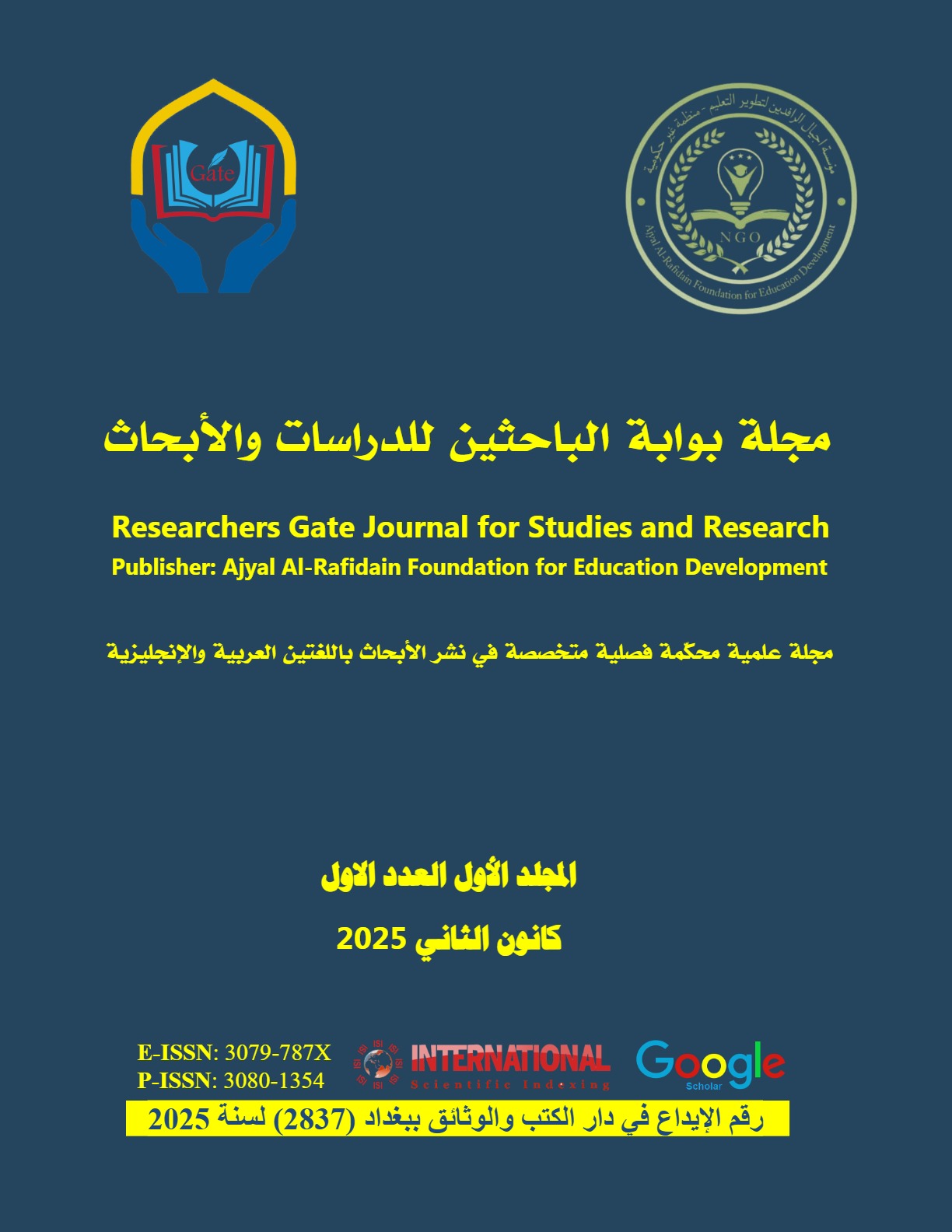جدلية الوطن والمنفى في شعر الجواهريّ
DOI:
https://doi.org/10.64337/rgj.v1i1.2الكلمات المفتاحية:
الجواهري، الوطن، المنفى، الشعر العربي الحديث، الجدلية.الملخص
وصل حال بعض الشعراء، لا سيما المحدثين والمعاصرين، إلى أن يعيشوا تجربة النفي بعيدًا عن أوطانهم لأسباب متنوعة، غلبت عليها الدوافع السياسية. انعكس هذا النفي في أشعارهم التي صوّرت منفاهم بشيء من الألم والأسى، حيث عبّروا عن معاناتهم وأسباب نفيهم أحيانًا بشكل صريح وأحيانًا آخر بالإشارة والتلميح.
ومع امتداد غربتهم، بدأوا ينظرون إلى أوطانهم من زاوية المنفى، فرأوها بهيئة المعشوق الذي يوقظ القلب شوقًا وحنينًا ويستحضر في ذاكرتهم صورًا دافئة من الماضي.
هذه حال الشاعر الذي اخترته موضوعًا لدراستي، وهو محمد مهدي الجواهري. كان الجواهري مثالًا لشاعر شامخ ينتمي بروحه وأسلوبه إلى نخبة فريدة مثل امرئ القيس والنابغة وطرفة وأبي تمام والمتنبي والمعري، لكنه تميز بانتمائه إلى عصره الحديث. اتسم شعره بالصدق العاطفي والنفَس القوي القادر على التأثير، مع عذوبة في الأسلوب وصفاء في التعبير. هذا التميز ينبع من الثنائية التي سيطرت على حياته—ثنائية الوطن والمنفى—والتي هزّت أعماقه وأثارت توتره الداخلي حتى بلغ ذروته. هذه الثنائية كانت مصدر إلهامه كما كانت ملاذه، لترتقي روحه وينساب قلمه بمعزوفات شعرية خالدة تُعتبر من أعظم إبداعات الأدب العربي في عصرنا.
المراجع
1. ابن منظور، محمد مكرم. (1997). لسان العرب. دار صادر.
2. أبو البقاء الكفوي، أيوب بن موسى الحسيني. (1998). الكليات معجم في المصطلحات والفروق اللغوية والأصولية. مؤسسة الرسالة.
3. الأعرجي، محمد حسين. (2002). دراسة ووثائق. دار المدى.
4. الجواهري، خيال. (2004). الجواهري مسيرة قرن. وزارة الثقافة.
5. الجواهري، خيال محمد مهدي. (1999 م). الجواهري وسيمفونية الرحيل. وزارة الثقافة.
6. الجواهري، محمد مهدي. (1935). الديوان. مطبعة الغرى.
7. الجواهري، محمد مهدي. (1979). الديوان. وزارة الثقافة.
8. الجواهري، محمد مهدي. (1982). الديوان. دار العودة.
9. الجواهري، محمد مهدي. (1984). الديوان. وزارة الثقافة.
10. الجواهري، محمد مهدي. (1986 م). الجواهري في العيون من أشعاره. دار طلاس.
11. الجواهري، محمد مهدي. (1988). ذكرياتي. دار الرافدين.
12. الجواهري، محمد مهدي. (1998). الجواهري في العيون من أشعاره. دار طلاس للدراسات والنشر.
13. الجواهري، محمد مهدي. (بلا تاريخ). الديوان. دار العودة.
14. الجبوري، كامل سلمان. (2002). معجم الأدباء من العصر الجاهلي حتى سنة 2002. دار الكتب العلمية.
15. درويش، عدنان ت. (1998). الكليات. مؤسسة الرسالة.
16. رافع، اعتدال. (1999, 3). الجواهري رحلة الألم والثورة. مجلة العربي.
17. سلمان، صباح مندلاوي. (2000). في رحاب الجواهري. دار علاء الدين.
18. صليبا، جميل. (1979). المعجم الفلسفي. دار الكتاب اللبناني.
19. العلوي، هادي. (1997). الجواهري والتراث. ملحق الثورة الثقافي, 72(5), 5.
20. علوان، علي. (1989). الشعر العراقي الحديث. وزارة الثقافة.
21. اليحي، فرحان. (2002). أزمة المواطنة في شعر الجواهري، دراسة تحليلية في ضوء المنهج التكاملي. اتحاد الكتاب العرب.
22. اليحيى، فرحان. (2001). أزمة المواطنة في شعر الجواهري.
23. الملاس، مصطفى. (1985). شاعر وقصيدة. دار طلاس.
















